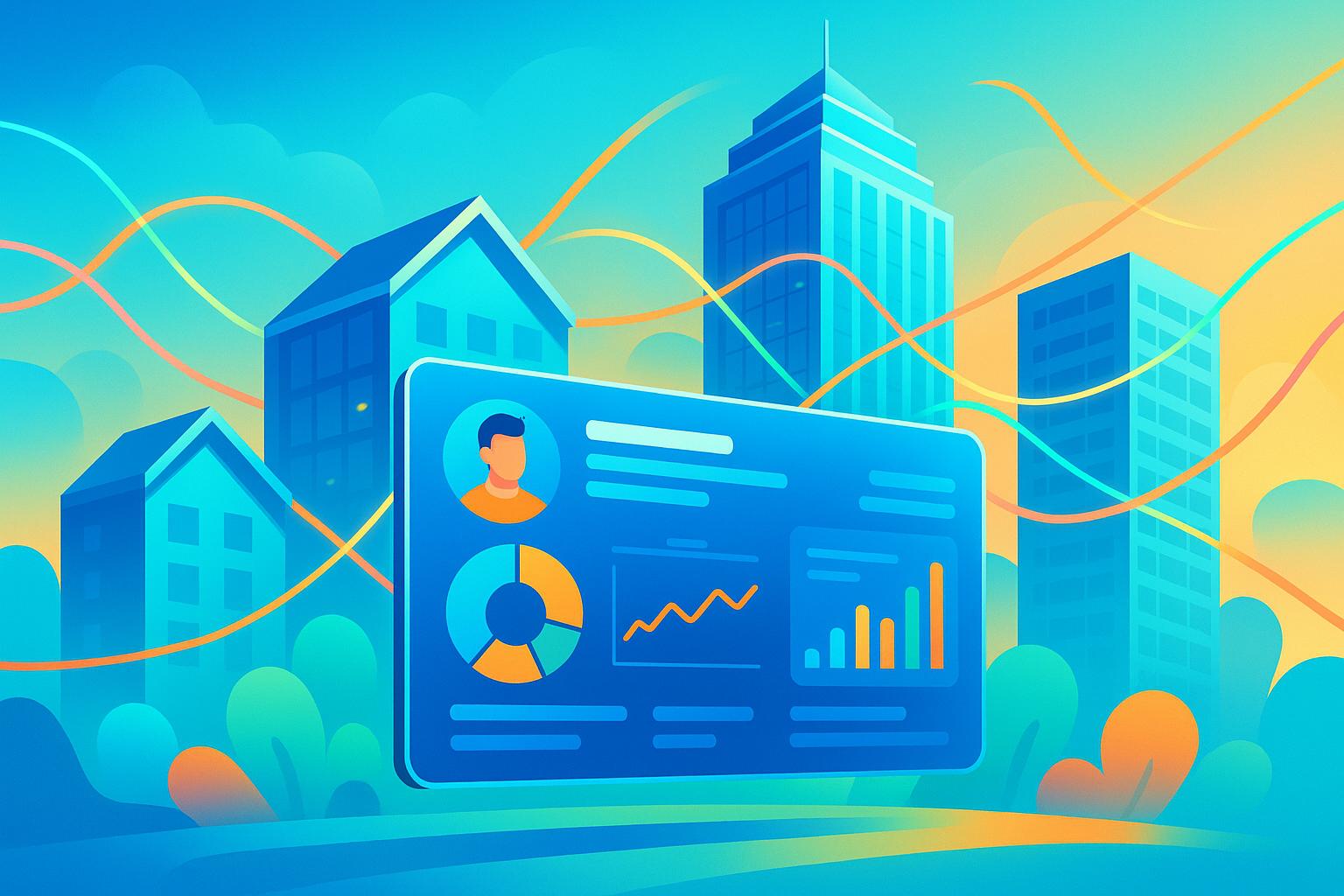Zoning reports are essential for understanding a property's legal use, development rules, and compliance status. They guide real estate professionals in making informed decisions about investments, development, and risk management.
Key Takeaways:
- What They Include: Zoning classifications, building restrictions (height, setbacks, FAR), parking requirements, and compliance checks.
- Who Uses Them: Developers, investors, lenders, brokers, and legal professionals for feasibility studies, risk assessments, and due diligence.
- Why They Matter: Ensure compliance, avoid legal issues, and plan property use effectively.
- AI's Role: Speeds up research with automated zoning analysis, compliance checks, and property evaluations.
Zoning reports are a must-have for commercial real estate transactions, and AI tools are making the process faster and more precise.
Core Parts of Zoning Reports
Zoning reports play a crucial role in shaping investment and planning decisions in commercial real estate by outlining key property details and regulations.
Property Zone Types
Zoning classifications define what activities are allowed on a property. These classifications directly affect property value and how the property can be used.
| Zone Type | Primary Purpose | Typical Uses |
|---|---|---|
| C1 | Local Service | Small retail, professional offices, neighborhood services |
| C2 | General Commercial | Larger retail, shopping centers, restaurants |
| Light Industrial | Manufacturing | Warehouses, assembly facilities, research centers |
| Mixed-Use | Multi-purpose | Combined retail, office, and residential spaces |
"C1 is for businesses that are very locally serving... Generally speaking, you're not going to have people coming from afar".
Allowed Uses and Limits
Zoning reports outline several important restrictions and requirements, including:
- Building Dimensions: Rules for height, setbacks, and floor area ratio (FAR)
- Occupancy Limits: Maximum number of occupants and usage intensity
- Operating Hours: Approved business operating times
- Parking Requirements: Minimum parking spaces based on property size
"Zoning regulations for Commercial Districts lay out the rules governing the wide variety of commercial places in the city, including retail centers in Manhattan, shopping centers along arterial highways and the local retail streets found throughout the city's neighborhoods".
These restrictions ensure properties are used in ways that align with local regulations and community goals.
Code Compliance Status
Zoning reports also evaluate whether a property complies with all relevant codes. This involves:
-
Compliance Analysis
- Comparing existing structures to current zoning rules, noting any non-conformities or grandfathered conditions
- Documenting zoning, building, or fire code violations
- Identifying special permits, variances, or conditional approvals
"One would look at a zoning map and see what the laws are in the area you're interested in and therefore be able to understand what you can build or what kind of business you can run in that area." - Paula Crespo, Senior Planner at the Pratt Center for Community Development
Using Zoning Reports for Better Decisions
Risk Prevention
Zoning reports play a key role in avoiding expensive mistakes in commercial real estate. A detailed zoning analysis typically examines:
| Risk Area | What to Review | Why It Matters |
|---|---|---|
| Property Use | Current zoning classification | Confirms the intended use complies with rules |
| Development Standards | Height limits, setbacks, FAR | Avoids construction violations |
| Compliance Status | Existing violations, permits | Prevents inheriting legal or regulatory issues |
| Future Changes | Pending zoning amendments | Shields against unexpected restrictions |
"A Zoning Report contains important property information such as use-rights, development conditions, and compliance status, and are often a requirement of real estate due diligence by real estate professionals seeking to secure financing or assess their property investment." – Zoning Research Group
Property Use Planning
Beyond identifying risks, zoning reports are valuable for planning how to best utilize a property. Understanding zoning regulations enables smarter investment and development decisions.
AI-powered tools simplify this process by helping to:
- Analyze permitted uses across various properties
- Pinpoint properties that align with specific business needs
- Assess development potential within zoning constraints
Meeting Legal Requirements
Zoning reports are also critical for meeting legal and regulatory standards during real estate development:
- Financing Applications: Lenders often need comprehensive zoning details to evaluate property risks and confirm due diligence before approving financing.
- Development Approvals: Accurate zoning data is essential for local authorities when reviewing development proposals. Well-prepared zoning reports can speed up approvals and reduce the likelihood of rejection.
- Compliance Verification: Regularly reviewing zoning reports ensures properties remain in line with local regulations, particularly for those with conditional approvals or specific use restrictions. AI tools can make compliance checks faster and more efficient.
These legal safeguards, combined with AI-driven tools, give stakeholders an edge in zoning research and decision-making.
sbb-itb-11d231f
AI Tools in Zoning Research
AI-Powered Research Methods
AI technology has reshaped how real estate professionals tackle zoning research. Algorithms can now process huge volumes of municipal data, zoning codes, and property details in just seconds. This shift allows professionals to:
| Research Task | Traditional Method | AI-Enhanced Method |
|---|---|---|
| Zoning Classification | Manual code lookup | Automated classification |
| Use Rights Analysis | Individual permit review | Automated compliance check |
| Development Potential | Reviewing multiple docs | Unified dashboards |
| Compliance Verification | Searching physical docs | Digital verification |
By automating these tasks, professionals can collect data more efficiently and conduct property searches with greater precision.
Finding Suitable Properties
AI zoning tools make property searches faster and more effective by analyzing multiple factors simultaneously. These tools can assess:
- Property Classifications: Quickly identify zones that meet specific business needs
- Use Restrictions: Automatically filter properties based on permitted uses
- Development Parameters: Evaluate building height limits, setbacks, and Floor Area Ratio (FAR) in seconds
"Zoning due diligence is a necessary component of most commercial real estate transactions. Our easy-to-read, color-coded zoning reports help our clients quickly identify potential issues with their property."
– Zoning Reports LLC
These insights make property evaluations more efficient and accurate.
Speed and Accuracy Benefits
AI tools bring major improvements to zoning research by saving time and boosting reliability. Here’s how:
-
Time Savings
Comprehensive zoning analyses that once took hours or days can now be done in minutes. Automated systems process municipal databases and zoning codes at lightning speed. -
Improved Accuracy
AI tools minimize human error by cross-referencing multiple data sources, keeping regulations current, and applying consistent analysis methods. -
Broader Coverage
These systems handle vast transaction data, ensuring:- Compliance with lender standards
- Strong regulatory adherence
AI integration in zoning research delivers quicker, more precise, and thorough property analyses, revolutionizing commercial real estate due diligence.
Zoning Reports in Action
Property Location Selection
Developers rely on zoning reports to pinpoint the best sites for their projects. These reports provide details on permitted uses, development conditions, and compliance requirements, all of which directly influence site selection.
| Selection Criteria | Zoning Report Insights |
|---|---|
| Use Rights | Allowed commercial activities |
| Development Limits | Building height, setbacks, floor area ratio (FAR) |
| Compliance Status | Existing violations or restrictions |
| Parking Requirements | Minimum spaces and layout guidelines |
Once a property is chosen based on these criteria, developers move on to detailed planning to maximize its potential.
Project Planning
Zoning reports simplify the planning process by summarizing land use options, economic potential, and design constraints. They help identify challenges early, enabling architects and planners to create designs that comply with local regulations while optimizing property value. These reports cover essential aspects like use restrictions, parking standards, and development requirements, ensuring that designs align with both rules and financial goals.
With the location and project blueprint in place, investors use zoning reports to assess the financial prospects of the property.
Investment Analysis
Investors depend on zoning reports for due diligence and property valuation. These reports evaluate use rights, development limitations, and compliance issues to provide a clear picture of a property's potential. This information is critical for financing decisions and estimating returns on investment.
Key uses include:
- Due Diligence: Comprehensive reports support high-stakes transactions
- Value Analysis: Assessing development potential and constraints
- Financial Planning: Creating precise return projections based on allowable uses
"Zoning due diligence is a necessary component of most commercial real estate transactions. Our easy-to-read, color-coded zoning reports help our clients quickly identify potential issues with their property."
Zoning reports have become a must-have for real estate due diligence, especially when securing financing or evaluating investments.
Conclusion
Main Points
Zoning reports play a critical role in making informed decisions in commercial real estate. They provide detailed analyses of compliance with use rights, parking standards, and development requirements, helping guide investments and project planning. For professionals involved in financing or property assessment, these reports are a key part of the due diligence process.
| Key Areas | Benefits |
|---|---|
| Due Diligence | Simplifies compliance checks |
| Risk Assessment | Identifies potential issues early |
| Development Planning | Defines clear usage guidelines |
| Investment Analysis | Offers insights into property value |
Zoning reports act as a foundation for informed decisions across all stages of commercial real estate - from acquisition to development. Their established benefits are now being enhanced by the integration of AI technology.
Future of AI in Zoning
AI is reshaping zoning research, making it faster and more efficient. Tools like those from Plotzy can cut preliminary analysis times down to just two business days. This speed is a game-changer for brokers, developers, and land acquisition teams who need quick and accurate property evaluations.
AI-driven tools now allow professionals to:
- Generate detailed property reports instantly
- Search for parcels based on zoning criteria
- Access comprehensive owner contact details
- Analyze multiple properties at once


